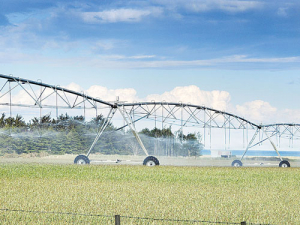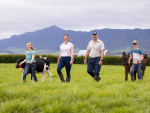Environment Canterbury's proposed Plan Change 5 (PC5) is unworkable, says Federated Farmers Mid-Canterbury chairman Michael Salvesen.
PC5, the nutrient management and Waitaki plan change, was publicly notified on June 24 and is due to take effect progressively in various zones from now to January 2019.
ECan says it seeks to deal with the effects of land uses -- particularly farming -- on water quality region-wide, and ensure the effective management of water quality in the Waitaki catchment. It will apply in catchments not currently the subject of sub-region plans (such as Selwyn Waihora) but is expected to impact about 5000 farms.
ECan councillor Professor Peter Skelton says the plan change sets industry agreed ‘good management practices’ (GMPs) as the minimum standard for all farming. Resource consents, including audited farm environment plans, will be required if the area of winter grazing or irrigation on a property exceeds permitted limits.
“The nutrient management rules are intended to address the effects of changing land use and promote improved water quality outcomes throughout the region. We need to be clear about what constitutes good management practice on farms; industry groups have now described what this means for their sector.”
All farmers should have, as a starting point, a baseline nitrogen leaching rate that reflects GMP.
ECan has developed a Farm Portal website to collate and calculate information and the plan change requires farmers to register their farming activities on the portal.
However, Salvesen says while some parts are “quite good” there is also a lot wrong with the plan. Some of the fertiliser and irrigation proxies (calculation models) are unworkable.
But he says ECan will have to discover for itself how it will not actually work onfarm.
“We’ve told them it’s unworkable and we’ve said we’re not going to appeal because you’ve made it too difficult in law -- you’ve written it in such a way. So it’s unworkable and you can sort your own mess out.”
“It says irrigation’s got to run at 100% efficiency and there is to be no drainage below the root zone, both of which are impossible in a natural system. Irrigation does not run at 100% efficiency, it doesn’t matter how good you are. We can’t comply, full stop.”
Salvesen says if ECan asked farmers a few more questions they “wouldn’t get it so wrong”. Farmers thought they were consulting in good faith. We thought we were but it transpires they weren’t actually listening.”
He points out the expense to farmers of trying to comply with the plan: 4000 applications for consents, lodged at a minimum cost of $1700 each, plus farm environment plans, would cost at least $20 million for paperwork; better to spend that on mitigation factors such as fencing and planting.
Salvesen, who raises beef and deer in hill country in the upper Hinds catchment, says that while most of the impact would be on the plains the plan change was not all good for the hills either. “Some of the fencing requirements they’re putting in are completely impractical.”
Outspoken Ashburton dairy farmer Willy Leferink is warning that some debt-laden farmers could face bankruptcy if the plan change forces them to cut cow numbers to comply with the new environmental limits.
He says farmers understand they need to do something, but fear they will be regulated by a tool that is unreliable.
Leferink says the portal is “not easy, the farmers don’t understand it, and [some of] the scientists don’t understand it”.
“We don’t know if it’s all true because some of the science is in its infancy. Then on top of that we have all the calculations. It looks like some wizard is pulling it out of his hat.”
In some cases the calculations made “no sense at all,” says Leferink.
“You’re going to be judged against this hypothetical ideal model of your farm, where in a lot of cases it doesn’t make any sense to the current state of your property.”
Leferink also refers to the impossibility of requiring 100% efficient irrigation. “They’ve set themselves up to fail.”
He says farmers would have to spend $2000 - $5000 every two years just to get audits done because it would become too complicated to do it themselves.
DairyNZ ready to cooperate
DairyNZ chief executive Dr Tim Mackle said in a statement that DairyNZ acknowledges the significant water quality and quantity issues facing Canterbury dairy farmers and supports the basic approach of using GMPs and FEPs to monitor farm performance.
Mackle says DNZ will work with ECan to support farmers implementing the changes, and is pleased the hearings panel has accepted its concerns over the timeframe and extended compliance deadlines by 12 months.
DairyNZ also supports, “at the conceptual level,” the development of the farm portal system but has concerns that some of the equations used to model GMPs may lead to significant differences between a farm’s nitrogen losses when estimated by Overseer and the estimated nitrogen losses when the farm is operating at GMP.
DairyNZ will help resolve issues as they arise and says farmers should contact them for help if the numbers produced by the farm portal model “don’t make sense.”
DNZ also has concerns about the irrigation model within the portal.
“We consider that for irrigating dairy farmers the compliance requirements under PC5 may be unachievable with the current irrigation infrastructure. We believe farmers may have to fund considerable costs over a short time to comply with the plan change requirements.”
PC5 was publicly notified on June 24 and any appeals must be lodged by July 21.











